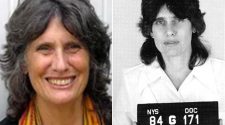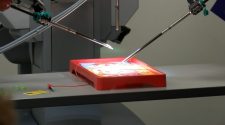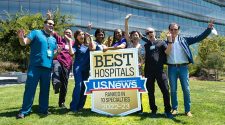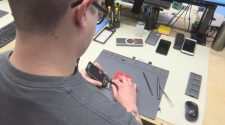RED BANK, NJ: Red Bank Regional has been recognized both locally and nationally, as one of the “Top,” “Most Challenging,” and “Best” high schools.
A significant reason for these accolades has been their 4-Year Academies: Visual and Performing Arts, Information Technology, Engineering, Finance and the Academy of Early Childhood Education.
We asked David Fusco, Supervisor for the both the Academy of Information Technology and the Academy of Engineering some questions to provide some insight on the application process, classroom curriculum and the achievements they’ve reached.
TAPinto: Tell us a little about yourself, where you grew up, your education and what made you interested in engineering and computer science
Fusco: I’m a Jersey guy through and through, and grew up in Jackson Township. I graduated from Rutgers University with a Bachelors in Biology. I was always a science and math guy. I explored several career paths, but the thread that was always there was education, and selected that as a minor when I graduated.
I began my career at Monmouth County Communications High School. I went back for my Masters in Molecular Biology at Georgian Court College as I was thinking about teaching in college. I transitioned to the Biotechnology High School in Freehold which really aligned with my interest.
I decided to earn my Administrative Certificate and after a short search I connected with Red Bank Regional and have been in my position for the past 5 years
TAPinto: You’re the supervisor of both the Academy of Engineering and the Academy of Information Technology. Please provide an overview of the Engineering Academy and how real life/world applications are applied to the learning
Fusco: We are partnered with Project Lead the Way which is a national high school engineering curriculum and consortium that provides training to CTE (Career Technical Education) teachers. These teachers obtain certification though experiencing activities and opportunities and then return to teach the courses. Our engineering students are required to take an AP (Advanced Placement) and Computer Science Principles course. Every student takes an elective chain that’s comprised of 2 courses per year, with several students taking a total of 8 courses. By the time they’re seniors, about a quarter of their high school career has been in the Academy of Engineering.
The students start with introduction courses, move on to engineering processes, supporting computer programming courses, principles of engineering, engineering design and development. The courses are designed to build a clear pathway with increasing difficulty, challenges and complexity over the years.
It’s very rare to have an engineering student with an undeclared major. It can be aerospace, electrical, environmental or chemical engineer. We want to give students as much exposure to the different fields as possible, so they can select specific electives that most interest them.
TAPinto: Same question for the Information Technology Academy
Fusco: We have two strands: networking and computer science. Computer Science, technical programming and coding are comprised of 4 courses that are all built upon each other. Networking is introducing students to the behind the scenes work that goes into IT careers; how computers talk to each other, how business secure interactions on the Internet, cybersecurity and digital forensics where how the law might use IT to help track criminal activity online.
These things are frequently in the news and our courses are built upon case studies and applications in the real world. We bring in experts in the field as guest speakers, and they help to show students how the job that they (the speaker) are in relates to the content of what the students are learning.
We also do field trips to companies, so that students see and hear what the engineering and IT professional are doing, which reinforces their learning
TAPinto: What state and national events do the that students compete in?
Fusco: The students compete in several clubs that expand into both the engineering and computer science courses. These include the Technology Student Association and Future Business Leaders of America. Our most successful national competition is the CyberPatriot Program which is a national youth cyber education program created to help direct students toward careers in cybersecurity. It’s very well aligned with our curriculum and a few years ago, one of our teams placed 2nd on the national level
TAPinto: What’s required of the student to be accepted into these Academies?
Fusco: We collect student information from the 7th and 8th grade. We’re looking at their academic and attendance record, performance on state tests if available, and our own math and placement exams. We allow students to apply up to two academies. When it comes down to acceptances, it’s based on the number of seats we have to offer. As a regional school district, we receive students from Red Bank, Little Silver and Shrewsbury. The number of seats offered are based on the number of students coming to RBR and what our capacity is for our freshman class. On average, we get between 100 and 200 applications for both academies
TAPinto: In addition to grades, what other attributes do you look for in an applicant?
Fusco: There’s nothing formal that would hold them back from acceptance. We want students to be creative, curious collaborative, problem solvers; anyone that enjoys solving a problem with others
TAPinto: What’s the best part about your job?
Fusco: Being able to interact with these students and watch them in action. Being in the classroom and watching teachers work magic with these kids and observe them do things you don’t see in typical high school classes. I try to express to the students that I hope they realize the opportunities they have here. This isn’t your typical high school education
TAPinto: Most Challenging?
Fusco: To advocate for the students to have internship experiences. Once we get them in the door, we had companies say to us that your high school kids were better prepared than some college interns we’ve had. Getting 100% of our students into an internship has been our most challenging thing
To watch a video that provides an overview of RBR’s 4-Year Academies, click HERE.
If you enjoyed this article please “Like” and “Follow” us on the TAPinto Red Bank Facebook page, and sign up for our daily e-news so you’ll never miss what’s happening in Red Bank!
And please share this article with your friends and family!
Know a local story we should share with readers? Email Editor E. Scott Wingerter and tell him about it.
TAPinto Red Bank is free to read, funded entirely by business advertising – 40% of our readers have purchased a product or service after seeing an ad on TAPinto














